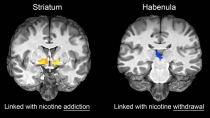The likelihood of a cigarette smoker successfully quitting on any given attempt is low, given uncomfortable, negative affective withdrawal symptoms. Nicotine withdrawal symptoms are linked, at least in part, with reduced activity in the brain’s reward processing system, so scientists want to better understand activity in these areas of the brain before and after receiving available smoking cessation medications.
In this study, researchers gave two commonly used smoking cessation medications [nicotine patch and varenicline (Chantex®)] or placebo to nonsmokers and smokers (who had not smoked overnight). The researchers then asked the participants to play a game in which they received positive or negative feedback based on their performance. At the same time, the researchers measured participants’ brain activity using functional magnetic resonance imaging (fMRI). This allowed scientists to look at the brain’s habenula and striatum, two interconnected brain regions believed to be linked to reward processing. Previous research using this task showed that positive feedback activated the striatum, whereas negative feedback activated the habenula.
In this study, smokers, compared to nonsmokers, showed reduced activity in the striatum when given positive feedback. Larger reductions were associated with higher levels of nicotine addiction. This effect did not change when smokers got either medication. These findings suggest that these medications are not targeting the striatum and that smokers treated with them likely continue to experience reward processing deficits that could make pleasurable activities less enjoyable.
The study also found that higher activity in the habenula, which has been linked to nicotine withdrawal and negative reinforcement, was associated with higher levels of tobacco craving. Nicotine decreased habenula activity following both positive and negative feedback in smokers, but not in nonsmokers. The scientists suggest that elevated habenula activity during withdrawal is a potential target for new smoking medications.
The research was conducted by scientists at NIDA’s Intramural Research Program and Florida International University with additional funding support from the National Institute on Minority Health and Health Disparities.
Study:
- Jessica S. Flannery, Michael C. Riede, Ranjita Poudel, Angela R. Laird, Thomas J. Ross, Betty Jo Salmeron, Elliot A. Stein, Matthew T. Sutherland. Habenular and striatal activity during performance feedback are differentially linked with state-like and trait-like aspects of tobacco use disorder. Science Advances.

